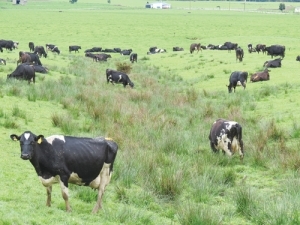Battle for milk
OPINION: Fonterra may be on the verge of selling its consumer business in New Zealand, but the co-operative is not keen on giving any ground to its competitors in the country.
 ComCom has queried whether new dairy conversions should have 'open entry' to join Fonterra in its latest report.
ComCom has queried whether new dairy conversions should have 'open entry' to join Fonterra in its latest report.
The Commerce Commission has queried whether new dairy conversions should have 'open entry' to join Fonterra in its latest report.
In the report released today the Commerce Commission says there is not sufficient competition at the farm gate and factory gate to consider full deregulation at this time.
Deputy Chair Sue Begg says keeping the open entry and exit provisions in place during any reforms would help with the transition by aiding the growth in competition at the farm gate by suppliers that could then enter the factory gate market.
"However, we think it is worth exploring whether open entry for new dairy farm conversions should be removed," Begg says.
"Open entry for new conversions contributes little to supporting competition in the farm gate market, while imposing costs on Fonterra."
The Commission released its final report on the state of competition in New Zealand's dairy industry in a review review which began in June last year at the request of the Minister for Primary Industries as required under the Dairy Industry Restructuring Act 2001 (DIRA).
Begg says while the costs and benefits of the DIRA Regulation are more or less balanced, the risks of removing it too soon outweigh the risks of it remaining longer than it should.
"As it stands, without regulation Fonterra would be able to increase the price of raw milk it sells to other domestic processors and this would likely flow through to higher retail prices of dairy products for New Zealand consumers," Begg says.
"Increased competition is needed, particularly at the factory gate, and our view is it is better to err on the side of caution before embarking on full deregulation."
The final report recommends that a pathway to deregulation would be smoothed by facilitating the development of a factory gate market for non-DIRA milk. Options the Minister could consider include:
· reducing DIRA milk entitlements;
· investigating if and when the DIRA milk price covers Fonterra's opportunity costs; and
· tightening the terms and conditions for DIRA milk supply.
The final report also confirms the recommendation to reset the market share thresholds in both the North and South Islands to 30% (up from the current 20%), as well as resetting the time limit threshold to the 2021/22 season as the triggers for the next competition review of the dairy industry.
"The support of the dairy processors, industry bodies and experts has been integral to enabling us to complete this work in such a short timeframe. On behalf of the Commission, I would like to thank all those who provided information, gave interviews and submitted on our draft report," Begg says.
Keratin biomaterials company Keraplast and Wools of New Zealand have signed a new superpremium wool contract which is said to deliver a boost to wool growers.
While things are looking positive for the red meat sector in 2026, volatility in global trade remains a concern, says the Meat Industry Association (MIA).
The quest to find innovative practical, scientific solutions to deal with water-related issues at a catchment level has been the theme of an important conference at Massey University last week.
One of the country's top Māori farms faces a long and costly rebuild to get the property back to where it was before recent storms ripped through it.
The latest Global Dairy Trade auction results have delivered a boost to dairy farmers.
New Zealand potato growers are prioritising value creation from high yields to meet a complex mix of challenges and opportunities, says Potatoes NZ chief executive Kate Trufitt.